The History Of BMW Compact

The BMW Compact was a compact car / small family car, basically a truncated liftback version of the BMW 3 Series, produced by the German automaker BMW between 1993 and 2004. The wheelbase remained the same as the full-size sibling. From 1994, it was based on the BMW E36 platform, switching to the BMW E46 platform in 2001. Production of BMW Compact ceased in 2004 when it was succeeded by the 1 Series.
The car was available in 316i, 316g (compressed natural gas), 318ti, 318tds (diesel) and later as a 323ti. The title 'Ti'(Touring International) used on the more powerful versions, harking back to the ti models of the sixties.
The BMW E36/ 5 Compact shares its suspension with the BMW Z3, M Coupe/ Roadster, which has E36 front suspension and rear suspension based on the E30. From front bumper to A pillar, the Compact looks identical to the E36 sedan, sharing both front fenders, bumpers, lights and the hood.
In order to save space, the E36/ 5 made use of a smaller semi-trailing arm rear axle derived from the older 3-series (E30). The inherent design of the trailing arm suspension was that it favoured oversteer. Consequently, the Compact received mixed reviews from the automotive press, some claiming the chassis was the most balanced of the E36 range, while others said that the car wandered and darted in a straight line, and was uncomposed in the corners.
Trims
In North America, these models were equipped with a 1.8 litre, 138bhp (103kW; 140PS) four-cylinder M42 engine for the 1995 model year. In 1996, the engine was expanded to 1.9 liters (M44), a treatment given to all 318i/ 318is. As some changes were required to make the car compliant with OBD-II, power curve adjustments occurred at the same time. European buyers had the option of a smaller 1.6 litre engine, a four-cylinder diesel, and German buyers had the exclusive and rare 323ti option with a 2.5L, 170PS (125kW; 168hp) Inline-6.
The interior was all BMW: apart from a simple one piece dashboard, it shared the same seats and trim as the full-sized 3-series. 318ti came in different trim levels, including the base, Active and Sport. Sport package is similar to the ones offered to coupe/ sedan models, giving the car the suspension upgrade, colour coded bumpers, foglights, alloy wheels, sport seats and the like. Active package offered comfort items such as OBC(On-board computer), cruise control, sunroof and remote keyless entry.
The Clubsport edition was only offered in the model year 1995. It received the treatment of BMW Individual, much like the 1995 M3 lightweight and 1995 BMW E34 540i M-sport. The car had upgraded suspension, limited slip differential, sport seats, and full M-aerodynamic package including front and rear bumpers as well as side mirrors. It should be noted the Sport package for 1995 318ti had all the performance upgrade with no exterior distinction from the base model. Starting 1996, the sport package included the M-aerodynamic package like the Clubsport model, with the exception using the standard side mirror. Also there is a rare California edition of the vehicle, introduced in 1996, featured a Webasto style folding canvas roof reminiscent of those used in the Citroën 2CV. 1999 is a unique year for 318ti in US, since the introduction of E46 sedan/ coupe models, BMW has made a decision not to offer the four-cylindered cars available to the rest of the world. All 1999 318ti's came with the sport package. It is the rarest and most sought after of the E36 318 lineup by enthusiasts, being the lightest, fastest, best handling and least expensive.
To celebrate the 50th birthday of the German automobile magazine "Auto Motor und Sport", BMW M GmbH handbuilt (at least) one M3 compact. The car embodied all the technical and optical characteristics of the stock E36 M3, but in the compact body, and more. A quad exhaust tip, Recaro sports seats, four-point seatbelts and an alcantara steering wheel and gear lever were specific for this model. The car was donated to the automobile magazine, but there are no details of the car's present whereabouts.
During 1993/ 4, BMW built several prototype 5-door compacts, which looked outwardly even more similar to the saloon right back to the C-pillar. However, following the initially disappointing sales response to the Compact (in comparison to the Saloon & Coupe models) BMW decided not to offer a 5-door variant. The prototypes were stripped and the bodyshells disposed of.
Sales
The car was offered in the United States and Canada for model years 1995 through 1999. Despite being reasonably priced, starting at $19,900, the 318ti never enjoyed popularity in North America, selling much better in Europe. While consumers desired a less expensive BMW, two factors conspired to keep sales low in the US. First, the US market only sporadically supports the hatchback body style. Second, the SUV craze was beginning to surge.
The TI/ Compact was redesigned in 2000 (as part of the E46 line), but was never exported to North America. The E46 Compact does not feature styling similar to the rest of E46 cars. Most notably, the headlight assembly on the Compact models differ greatly from either coupe, sedan/ touring models.
In 2004, the TI/ Compact was effectively replaced by the BMW 1 Series (the 1-Series did not go to North America until 2008). After 2001, all Compact models had electric windows, leather steering wheel, traction control and alarm. The newer Compact also had better suspension, more interior space and a better interior finish.
Various Internet sources claim that the Compact is being considered for a revival for the 2008-2012 model year[citation needed]. It's claimed it will sport the same exterior as the TI/ Compact, but BMW haven't confirm any such information yet.
A Motorsport version of the car was briefly considered by BMW but it was concluded that such a production run would never return adequate profits. Despite this, the 16-valve versions 318ti compact and the various verions of the 318is (as 2 or 4-door E36, or as 2-door E30) won overall championships in the German endurance racing series on the Nürburgring, VLN in 2002, 2004 & 2006 and RCN/ CHC in 2003, as its class ("V2 standard cars up to 1850 cc") usually has the most entries due to the low costs, and thus slightly more points are rewarded according to the special scoring system. Yet, it was beaten to both the VLN and the RCN/ CHC title by 1600 cc Opel Corsa once (VLN 2003, RCN/ CHC 2005).
Versions available to the European market:
E36:
- 1994-1998, 316i: 1596 cc, I4, 8 valves, 75kW (102PS; 101hp), 150N·m (110lb·ft)
- 1999-2001, 316i: 1895 cc, I4, 8 valves, 77kW (105PS; 103hp), 165N·m (122lb·ft)
- 1995-2000, 316g: 1596 cc, I4 petrol/ biogas, 8 valves, 75kW (102PS; 101hp), 150N·m (110lb·ft)
- 1994-1995, 318ti: 1796 cc, I4, 16 valves, 103kW (140PS; 138hp), 175N·m (129lb·ft)
- 1995-2000, 318tds: 1665 cc, I4 diesel, 8 valves, 66kW (90PS; 89hp), 190N·m (140lb·ft)
- 1996-1999, 318ti: 1896 cc, I4, 16 valves, 103kW (140PS; 138hp), 180N·m (130lb·ft)
- 1998-2000, 323ti: 2494 cc, I6, 24 valves, 125kW (170PS; 168hp), 245N·m (181lb·ft)
E46:
- 2001-2004, 316ti: 1796 cc, I4, 16 valves, 85kW (116PS; 114hp), 175N·m (129lb·ft)
- 2002-2004, 318ti: 1995 cc, I4, 16 valves, 105kW (143PS; 141hp), 200N·m (150lb·ft)
- 2003-2004, 320td: 1995 cc, I4 diesel, 16 valves, 110kW (150PS; 148hp), 330N·m (240lb·ft)
- 2001-2004, 325ti: 2494 cc, I6, 24 valves, 141kW (192PS; 189hp), 245N·m (181lb·ft)
From Wikipedia, the free encyclopedia
More About BMW Compact
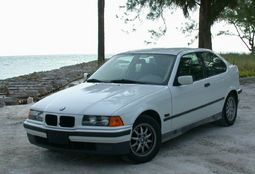
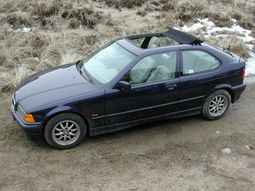
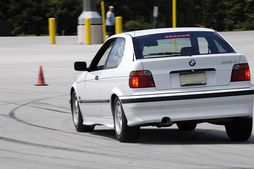
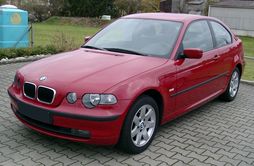
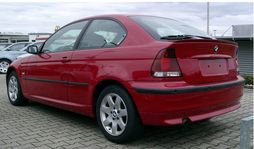
|